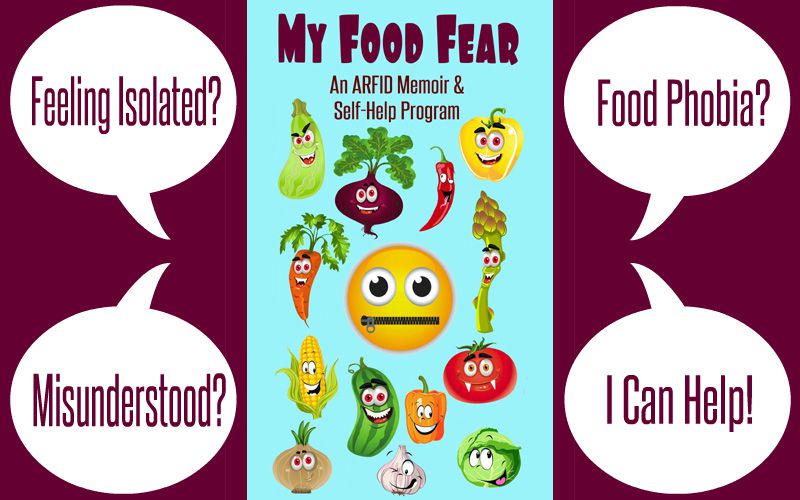Food fear and digestive health can be related physically and psychoemotionally. Gastrointestinal problems are often cited as reasons for selective eating, as well as consequences of selective eating. In this respect, digestive woes can be both contributory and resultant to ARFID (avoidant restrictive food intake disorder).
Are gastrointestinal issues related to your finicky eating habits? They certainly played a role in mine. In fact, I can now blame much of my past digestive problems on my selective eating, although probably not through any physical mechanism. Instead, my GI issues stemmed largely from the interactions between mind and body and were caused by my extremely selective eating habits.
This fascinating post encompasses much of my life’s work with chronic pain sufferers. It will tie together the psychological and physical reasons for various gastric disturbances that can be blamed on ARFID, as well as cited as being contributory to extreme picky eating. If you suffer from avoidant restrictive food intake disorder, or any manner of food phobia, and also suffer from some form of digestive/gastrointestinal problem, then this post is perfectly suited for you!
Digestive Woes Causing Food Fear
Many people who are highly selective eaters cite digestive issues as a major cause of their peculiar eating habits. These conditions can range from gas, bloating and occasional cramping to more serious expressions like frequent diarrhea, vomiting or ulcers. GERD and IBS are common modern diagnoses encompassing many digestive woes which may contribute to extreme finicky eating.
Citations of digestive difficulties usually come from adults, but some children might also complain of them, as well. Typically, particular foods seem to create negative effects in the gut and thereafter, these foods are arduously avoided. Over time, this can create an extensive list of prohibited foods items and might even cause the person to begin to suffer from ARFID when they generally ate normally in the past.
Many people fear that foods will make them sick, even if they do not suffer any physical symptoms. This is commonly associated with spicy foods, ethnic foods and various types of raw animal foods. Of course there is some justification of this fear, since some food items can make a person ill.

Food Phobia and Digestive Health Consequences
Food phobia can actually cause GI difficulties, as well. Nutritional deficiencies can cause the gut to malfunction. The stomach might produce too much acid (rare) or not enough (very common and often misdiagnosed as hyperacidity). The intestines might not move food along properly during digestion, causing all manner of possible symptoms ranging from bloating and gas to violent diarrhea.
These consequences might occur from eating a limited selection of foods or foods with very poor nutrition. Both of these occurrences are almost universally seen in people who suffer from ARFID. In fact, I have never met a selective eater who truly embraced a small selection of healthy foods! Instead, most people tend to feel comfortable with highly processed, packaged foods with little nutritional value. Obviously, a steady diet of these foods can cause health issues, including digestive tract dysfunction.
I am truly amazed that I was as healthy as I was when I was suffering from extreme ARFID. I grew up big and strong and was almost never sick. However, I did have a tendency towards mindbody symptoms and I now know that ARFID was related to the underlying causes of these symptoms during most of my life.
Food Fear and Digestive Health Advisory
Many people have such fear of food that they regularly become ill with some manner of digestive symptom. These symptoms are not caused by any nutritional deficit or any physical reason at all. Instead, they are directly motivated by the interactions between brain and body. This is called mindbody symptomology. The mind might create these symptoms for primary or secondary gain. Chronic anxiety and fear tend to create a variety of negative effects in the anatomy, so it is no surprise that people who suffer with ARFID often do experience GI discomfort, as well as many other possible types of symptoms, inducing chronic mindbody-motivated illnesses and pain syndromes. This occurrence has formed the basis of my life’s work.
I can tell you definitively that the vast majority of chronic health issues in the modern world are mistakenly attributed to innocent structural, functional and chemical sources. Most chronic gastrointestinal problems are certainly psychogenic, even in people without any eating disorder at all. However, any eating disorder, such as ARFID, can actually play the same role (serve the same purpose) as pain or other symptomology… It can help the repression process of sensitive psychoemotional issues that continuously strive for conscious recognition. I wrote and published 12 books on this topic and am happy to provide you much more information if you contact me directly.
